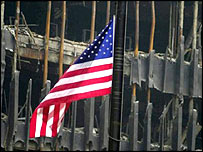Untitled Document
 |
|
The US government denies any wrongdoing in Mr Elmaghraby's case
|
The US government has agreed to pay $300,000 (£172,000) to settle
a lawsuit brought by an Egyptian arrested after the 11 September attacks, reports
say.
Ehab Elmaghraby was detained for nearly a year and deported after being cleared
of links to terrorism.
He claimed his rights were violated in custody and sought damages.
The settlement, in which the government did not admit wrongdoing, is said to
be the first involving claims of dozens of Muslims arrested after 9/11.
The lawsuit was filed in August 2004 by Mr Elmaghraby and a Pakistani citizen,
Javaid Iqbal. The latter is still pursuing the suit.
They argued the US government would not let them appeal their solitary confinement
in a special unit of the Metropolitan Detention Center in Brooklyn.
Mr Elmaghraby, a 38-year-old former restaurant worker, also alleged he was
mistreated.
The US government has dismissed the claims, saying that the circumstances of
the 11 September attacks justified extraordinary measures to confine non-citizens
who fell under suspicion.
'Baseless'
Their lawsuit accuses former US Attorney General John Ashcroft and other federal
officials of conspiring to violate the rights of Muslim immigrant detainees.
A federal judge ruled last year that Mr Ashcroft must answer questions on the
case under oath, but the government has appealed the ruling arguing that top
officials need immunity to combat future threats to national security.
The court settlement, which was filed in Brooklyn federal court on Monday,
has yet to be approved by a federal judge.
US rights bodies alleged last year that some 70 Muslim men were detained after
the 11 September attacks on baseless accusations of terrorist links.
Human Rights Watch and the American Civil Liberties Union criticised the US
for not arresting the men as criminal suspects.
The Justice Department said the material witness law was designed to allow
the detention of individuals thought to have information relating to a crime
but who might flee.

